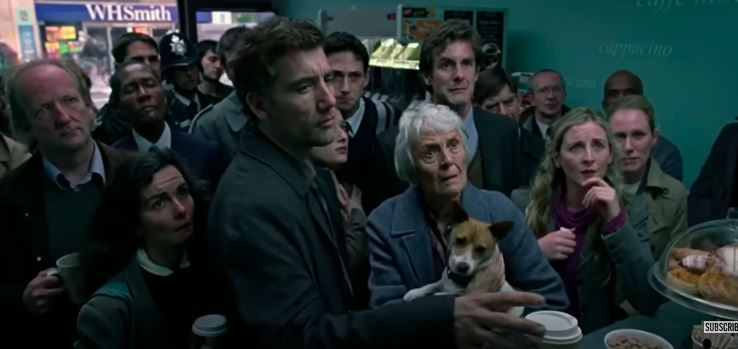In a world constantly on the edge of change, the 2006 film Children of Men offers a gripping, thought-provoking look into a future where hope seems all but lost. Directed by Alfonso Cuarón, the film paints a picture of a world that has been ravaged by human infertility, where the population is aging, and the idea of a future generation is almost non-existent.
Set in the year 2027, Children of Men follows the journey of a former activist named Theo Faron, played by Clive Owen, as he embarks on a mission to protect the world’s only known pregnant woman, Kee, played by Clare-Hope Ashitey.
The film has become a classic in the dystopian genre, not only because of its futuristic world-building but also for its exploration of social, political, and human themes. In this article, we delve deeper into the world of Children of Men, its plot, characters, cast, and why it remains a must-watch film today.
Plot Overview: A Future Without Children
The premise of Children of Men is set against a backdrop of near-total societal collapse. For 18 years, humans have been unable to reproduce, and as a result, the global population is in rapid decline. Governments are struggling to maintain order, and people are losing hope for the future. In this bleak environment, the UK has become a police state, with asylum seekers being hunted down and detained.
Into this grim future steps Theo Faron, a disillusioned bureaucrat who finds himself caught in the struggle to protect Kee, a young woman who is mysteriously pregnant. As a former activist, Theo is drawn into a mission to get Kee to a sanctuary where she can give birth safely, away from the turmoil that grips the world. This pregnancy represents the last hope for humanity, and its protection becomes the center of the film’s narrative.
The stakes are high, as various factions seek to control or destroy Kee for their own purposes, and Theo’s journey is one of survival, redemption, and ultimately, hope. Children of Men explores themes of sacrifice, the fragility of society, and the importance of hope in a world seemingly devoid of it.
Cast and Characters: Bringing the Story to Life
The film’s powerful performances are one of its defining features. Led by Clive Owen as Theo Faron, the cast brings the complex emotional and social themes of the film to life. Here’s a closer look at the key players:
| Character | Actor | Role Description |
|---|---|---|
| Theo Faron | Clive Owen | A disillusioned bureaucrat tasked with protecting Kee, a pregnant woman in a hopeless world. |
| Julian | Julianne Moore | A former activist and Theo’s ex-wife who is involved in the effort to protect Kee. |
| Jasper Palmer | Michael Caine | A former political cartoonist and Theo’s old friend, who assists in their mission. |
| Luke | Chiwetel Ejiofor | A revolutionary who has his own plans for Kee and the child she carries. |
| Kee | Clare-Hope Ashitey | The young woman who carries the world’s last hope—her unborn child. |
| Patric | Charlie Hunnam | A member of the group trying to assist Kee but with unclear motives. |
| Miriam | Pam Ferris | A member of the underground resistance who joins the mission to protect Kee. |
| Nigel | Danny Huston | A government official who controls access to the outside world. |
| Syd | Peter Mullan | A former associate of Theo who is involved in the desperate pursuit of Kee. |
Each actor brings a unique energy to the film, contributing to its portrayal of a society on the brink of collapse. The character of Theo, played by Clive Owen, serves as the film’s emotional anchor, navigating through a world where hope is in short supply. His complex journey from a jaded bureaucrat to a self-sacrificial protector is one of the most compelling aspects of the movie.
Themes and Social Commentary: Beyond the Dystopian Landscape

While Children of Men is a gripping dystopian thriller, it also serves as a sharp critique of contemporary social and political issues. At its core, the film explores the consequences of infertility, a world where humanity’s survival is questioned. This fictional scenario mirrors real-world concerns, including environmental degradation, political instability, and the fear of losing hope for the future.
The film’s portrayal of a near-collapse of society underscores the fragility of human progress. With infertility wiping out the possibility of future generations, the film examines the loss of innocence, the collapse of institutions, and the desperation that takes over in such a scenario. The film’s focus on Kee, the pregnant woman who embodies the last chance for humanity, emphasizes the value of life in a world where it seems so fleeting.
Moreover, Children of Men doesn’t shy away from addressing the treatment of refugees and marginalized groups. In the world of the film, asylum seekers are seen as a threat, rounded up and placed in internment camps. This reflects ongoing global issues, where displaced populations are often treated with disdain and hostility.
Cinematic Style: Alfonso Cuarón’s Direction
Alfonso Cuarón’s direction is a major reason why Children of Men remains a standout in the genre. Known for his mastery in creating immersive worlds, Cuarón’s work on this film is nothing short of remarkable. The film’s cinematography, shot by Emmanuel Lubezki, is breathtaking, using long takes and real-time sequences that draw viewers into the tense, chaotic environment of the story.
One of the most iconic scenes in Children of Men is the long, unbroken shot during a car chase, where the camera stays focused on Theo and his companions as they drive through a war-torn city. The use of such long takes creates an intense sense of realism, allowing viewers to feel as if they are living in the moment with the characters. This technique, combined with the film’s gritty, realistic set design, makes the world of Children of Men feel all too plausible.
Additionally, the film’s score, composed by John Tavener, adds to the emotional weight of the story, heightening the sense of urgency and desperation as the characters navigate their perilous journey.
Reception and Legacy: A Modern Classic
Since its release in 2006, Children of Men has received widespread critical acclaim for its bold storytelling, striking visuals, and powerful performances. It holds a 92% approval rating on Rotten Tomatoes and a 7.9/10 rating on IMDb, solidifying its place as one of the most highly regarded dystopian films of the 21st century.
The film’s depiction of a world ravaged by infertility and social collapse resonates deeply with contemporary audiences, making it relevant even years after its release. It’s often hailed as a masterpiece of science fiction cinema, with its exploration of hope, humanity, and survival at its core. The film has influenced countless filmmakers and continues to be cited as one of the most thought-provoking films in recent memory.
Children of Men was also recognized during awards season, receiving nominations for Best Adapted Screenplay at the Academy Awards, and winning numerous other accolades for its technical achievements, including its stunning cinematography and direction.
External Link: Children of Men on IMDb
For more details on the film, including cast and crew information, reviews, and additional trivia, check out the official IMDb page for Children of Men.
Conclusion: The Enduring Appeal of Children of Men
In the end, Children of Men remains a powerful exploration of a future where hope is in short supply. Its gripping plot, well-developed characters, and stunning visuals make it a standout film in the dystopian genre. But beyond its intense action and suspense, the film raises important questions about humanity, society, and the future of our world.
In a time when real-world challenges such as environmental crises, political instability, and social unrest seem to dominate the news, Children of Men serves as both a cautionary tale and a reminder of the importance of hope. The film asks us to consider what happens when humanity faces its greatest challenge—survival—and whether we will rise to meet it or let it slip away.
Table: Key Details of Children of Men
| Attribute | Details |
|---|---|
| Director | Alfonso Cuarón |
| Cast | Clive Owen, Julianne Moore, Michael Caine, Chiwetel Ejiofor |
| Release Date | 2006 |
| Genre | Dystopian, Thriller, Science Fiction |
| IMDb Rating | 7.9/10 |
| Rotten Tomatoes Rating | 92% |
| Key Themes | Infertility, Hope, Society Collapse, Survival |
Children of Men remains a poignant, unforgettable cinematic experience, drawing attention not only for its technical brilliance but also for its bold engagement with timely, critical themes. Whether you’re a fan of dystopian fiction or simply appreciate powerful storytelling, this film is one that stays with you long after the credits roll.
